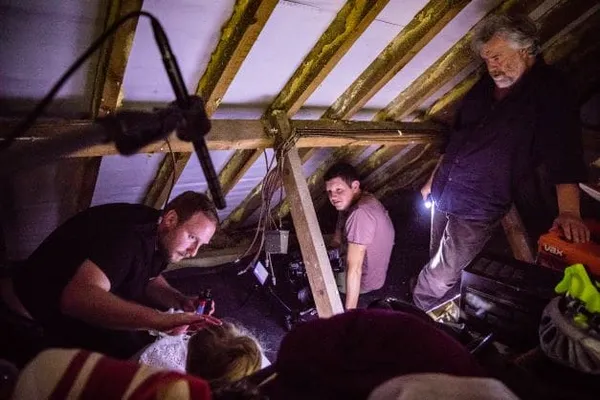 |
| On the set of Splinter |
The past decade has seen a revolution in independent film production, with increasingly affordable technology making it possible for far more people to get involved. As a consequence, there has been a flood of new works. The quality of the stories they have to tell varies enormously, but where they’ve been made with love and attention to detail, there’s usually something to enjoy about them. Still, they mostly look pretty rough. David Bryant’s Splinter is an intriguing exception. Though the plot is fairly straightforward, it features a solid central performance from Bill Fellows, and the quality of the technical work involved is really impressive – extraordinary for such a small scale production.
The man behind it all is writer/director/producer David Bryant, who shot it in his own home and is hoping to see it released in the UK within the next few weeks. We got together a little while before Christmas to talk about how this ambitious project came together.
“I was at film school, many, many years ago - a long time ago,” he says. “Since then, I basically started making short films, and then I've made a couple of features prior to this. All low budget, all really pulling it together with nothing. Over those productions, I've got to know some good people to work with. With this one, I knew what I wanted to do. What I'd learned is, don't try and go too big. So the whole idea was to write a script that has one central character, and then bring in people so that it makes it filmable without having to put people up for long periods of time, and stuff like that. Logistically – I think in both ways, because I produced it as well.
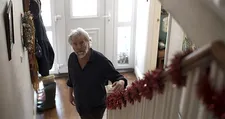 |
| Bill Fellows in Splinter |
“Artistically, I already knew the main actor, Bill, and we wanted to work together, so it was written for him. Whenever I write a script, I look at what's going on in the world and try and find something that's happening at the moment, so that I can use that - and then that make it into a genre piece, because that's more where I land, is in genre filmmaking. I want to bring something to that that's in the news. So with this, I wanted to look at mental health, but not make it so down to earth that it was a drama – to use that as a jumping off point and examine one man who's having a bit of a mental breakdown.
“If you want to do this at the level I've been doing – I mean, we made the film for under £10,000, and that's including everything – if you want to do that with films and you want to direct them, the best way to do it is learn to produce. It’s a logistical getting people together at the right time. It’s definitely a skill that you need to learn. I mean, you're not dealing with the money side of things so much, because you haven't got any.” He laughs. “It's more dealing with people, making sure you're being respectful and not asking for too much of their time.
“When you're making a film of this budget, you can't impose yourself too much on people. You're asking for quite a lot. So the way I try to do it, we actually shot this over five weekends, we did it over a period of a year or so. In many ways it was easier, because I could go back and reshoot stuff, but also it just helped with people's schedules and enabling them to work on the film.”
Does that approach present a challenge when it comes to maintaining consistency?
“It's odd,” he says, “because it lets you watch what you've done and realise if something hasn't worked. It actually gave me a lot of chances to go back and fix that. I had the film there for a long time before we shot because it was a long time coming. I knew the location inside and out and I've known Bill for a long time. We've spoken about the film quite a lot. So we, in many ways, had a bit of a shorthand. So when it came to directing, it was quite easy in a way – we all knew our roles and knew what was going on before we were there at the location, which doesn't happen very often on low budget. My job was made a lot easier by knowing what I was going to do.”
He’s a great believer in being well prepared, he explains. Of course, the challenging part of shooting at home was that he had to fit his life around a film set for all that time.
“Because it was over several weekends, now and again I would just have to clear everything out. And I mean, the house is quite sparse, I didn't want to over loaded with tons of furniture, but I would have to put my sofa outside and then bring in this other sofa. I had a room full of all the stuff that's in the film that I would have to bring out, including the Christmas tree, at all times of the year, so that was odd. Obviously I couldn't change the décor for about a year – we had to keep the same colours and look until it was completely shot.
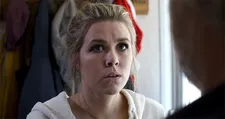 |
| Lucy-Jane Quinlan in Splinter |
“We're quite lucky that Bill, who's obviously a working actor, never got asked to shave his beard or cut his hair. He was the biggest continuity risk. Continuity was difficult but it was just a matter of having photographs, and I knew roughly where everything was, I mean, I'm sure if you examine the film, you'd probably spot balls in a different place on the tree, as we filmed them six months apart, but I was keeping track.”
There were challenges when it came to camera movement, too.
“We were working with Leighton [Wise], who's a good friend. I thought, if we shoot wide angle, we'll make the house look a lot bigger and we can get some movement we can follow in, but we found it was just too wide. We kept seeing stuff off camera, so we went back and reshot a lot of that much tighter. It felt more cinematic shooting it tighter as well. I storyboarded everything because I did have time between shoots, and if we were reshooting, I would know the shots I would want. I mean, I do think quite visually. And again, because it's my house, I could go around and do test shots, even just test photographs, so I could have a record of where the camera would be before we actually shot. Again, preparation.”
The sound in the film is also very good, and all the more impressive because there was no dedicated sound technician present during most of the shoot.
“We have Joel [Penn], who recorded a lot of it, and he was also camera assistants, so he was doing lights and stuff. And I recorded some of the sound. Luckily, where I live basically is very quiet. We're very lucky that we don't get much traffic, so we got all the dialogue very clean. There's not a lot of dialogue through a lot of the film, but then there are dialogue sections. We managed to get pretty good dialogue recording.
“Then we got Benji [Clifford], our sound designer, who did a hell of a lot of soundscapes and made it sound really good. The initial idea was to make a low budget film, but not make it feel like a low budget film, so really take care of the sound and really make it look good and give it a great shoot so that it felt more cinematic than most low budget films. And that's where I'm lucky that I found brilliant people. Leighton's camerawork was really brilliant, and the sound and the music – Adam Langston, who does the score, was absolutely brilliant. And again, this is why the film is actually taken a good few years to get finished, because I wanted to work with these people and obviously they're busy because they're doing paid jobs. It was all about respecting them and not rushing them.”
He got a big boost when producer Adam Bouabda came on board after seeing the first cut of the film at a festival, quickly finding funding for a better grade, an improved sound mix and some VFX which helped compensate for the face that no trained make-up artist had been available during shooting. The effect was to nudge the film a little further into horror territory.
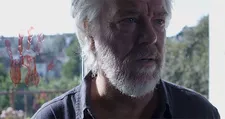 |
| Signs of trouble |
“We were very lucky that we got someone who came in and knew people that could come in and fix a few things. I think he took it to the next level – it was pretty good, but he raised it even further. And actually, I did do another cut. I managed to cut about five or six minutes early on in the film. It's still a slow build, but it felt a lot slower with just an extra five minutes.”
Unfortunately for the film’s festival journey, Covid then hit, changing everything.
“I sent it off to several festivals. We got into a few, [including the] Unrestricted View horror festival, which is a London based festival, but it was the year they were digital. So we picked the one year where festivals didn't have live screenings. The screenings were all online so we couldn't go along. At Unrestricted View, we won Best Director and Best Actor, but there was no awards, ceremony or anything like that.
“The problem with film festivals is this: it can be hugely expensive to do a festival run, and I really couldn't fund a big festival run. I mean, we did enter a few that we didn't get into, which was obviously always disappointing, but you can never tell why. I guess the film sits between thriller and horror. It's maybe not horror enough to get into the likes of Frightfest. With festivals it's a very difficult thing to judge because, number one, it's very expensive, so you've got to be very selective on where you send it, and you're not always going to gain.”
The film was successful, however, in finding a US distributor: genre specialists Gravitas.
“We haven't actually got a date for the UK yet – hopefully it should be early next year. We're thinking of doing a small DVD and Blu-ray release ourselves as well.”
Going forward, he says, he’s focusing heavily on screenwriting, and he has a couple of projects in development with Adam as producer. He’s working on a low budget vampire film, which he hopes will still look as polished as Splinter, and on a revenge thriller. Short versions may come first, for proof of concept.
“There's a dual career thing,” he says. “There's the writing/directing, and then what I'd love to do is to sell some screenplays and stuff. I'm working on a few more screenplays now. I'm open to projects. I'd love to work as a director on someone else's script, but it's finding projects, you know? There's so many people out there who want to write and direct scripts and stuff, and not as many producers. So I produced my films till now, but really out of necessity rather than wanting to do it. I love the writing part of it and I love the directing, and I really love editing as well.
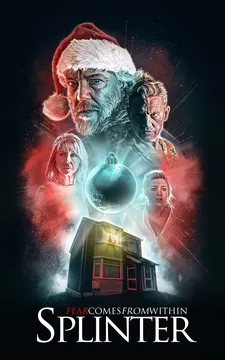 |
| Splinter poster |
“I love the part of filmmaking where you're planning the shot. I love storyboarding, because I love to visually see the film in my head. I'm a terrible artist so my stickman storyboard, I can just about draw the actual shape of it. So no one could probably understand what my storyboards mean except me, but I love that part. But then I just love the actual filming, the being on set and working with actors. I always get on really well with the actors.
“With Bill, he knew what he wanted to do. I was just showing him where he needed to stand, rather than actually performance wise. He got the character, we've spoken about it quite a lot before and he knew it.
“With Jane Asher and Michael McKell, they both got it. I had Michael for two nights to film all of his scenes, and we only had Jane for a day, so we shot all of her stuff in a day. The great thing with Bill is when he's with another actor, he lights up, you know? He pushes himself, it really brings out a lot more in his performance. I think it was difficult for him at times where he's alone quite a lot, in the film, and that was a bit odd for him. He's a very people person. He likes to be with other actors and stuff, but we managed.
“The cast was great. I mean, the editor’s son was in it, the little boy. I didn't really even have to say anything to him, he just did a really good performance. And Lucy as well the girl in the film. I've worked with her before a couple of times and she's absolutely brilliant as well. I rarely have to say much to her. She just comes in, she knows it.
“What I never wanted with this film was people to watch it thinking ‘Oh, you know, it's a low budget,’ and almost forgive it for that. So I try not to apologise for it in advance, like I have done in the past with other films before someone's actually even seen it. I want this to stand on its own and for people to watch it alongside a much bigger production and see it on equal terms.”





















